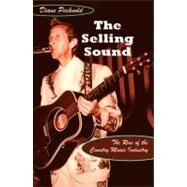Selling Sound
, by Pecknold, Diane- ISBN: 9780822340591 | 0822340593
- Cover: Hardcover
- Copyright: 12/30/2007
Few expressions of popular culture have been shaped as profoundly by the relationship between commercialism and authenticity as country music has. While its apparent realism, sincerity, and frank depictions of everyday life are country's most obvious stylistic hallmarks, Diane Pecknold demonstrates that commercialism has been just as powerful a cultural narrative in the development of country music. Listeners have long been deeply invested in the "business side" of country. When fans complained in the mid-1950s about elite control of the mass media, or when they expressed their gratitude that the Country Music Hall of Fame served as a physical symbol of the industry's power, they engaged directly with the commercial apparatus surrounding country music, not with particular songs or stars.In The Selling Sound, Pecknold explores how country music's commercialism, widely acknowledged but largely unexamined, has affected the way it is produced, the way it is received by fans and critics, and the way it is valued within the American cultural hierarchy. Pecknold draws on sources as diverse as radio advertising journals, fan magazines, Hollywood films, and interviews with industry insiders. Her sweeping social history encompasses the genre's early days as an adjunct of radio advertising in the 1920s; the friction between Billboard and more genre-oriented trade papers over generating the rankings that shaped radio play lists; the establishment of the Country Music Association; and the influence of rock 'n' roll on the trend toward single-genre radio stations. Tracing the rise of a large and influential network of country fan clubs, Pecknold highlights the significant promotional responsibilities assumed by club organizers until the early 1970s, when many of their tasks were taken over by professional publicists.







